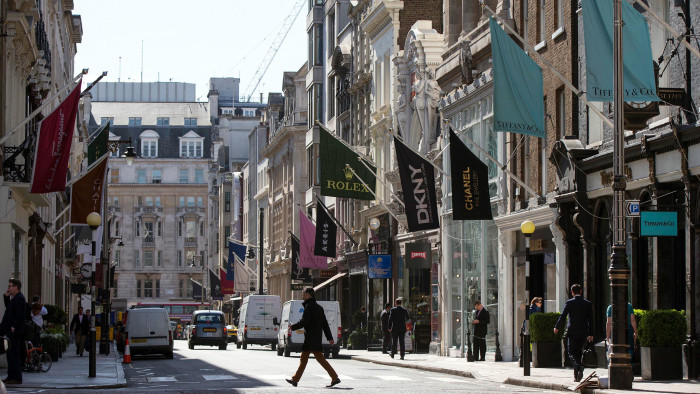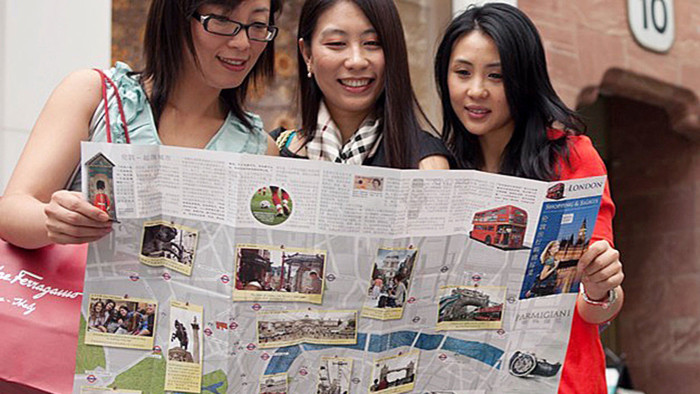Inside the luxury world’s commission culture

Roula Khalaf, Editor of the FT, selects her favourite stories in this weekly newsletter.
After an exercising tour of Westminster Abbey, Big Ben and the Houses of Parliament, a Chinese tourist can be forgiven for seeking respite in the luxury of a Bond Street jeweller. What they may not realise, as they browse diamond bracelets and Swiss watches, is that their trusted guide could be pocketing 10 per cent commission on anything they buy.
Typically, tour guides and their agencies broker deals with luxury retailers: commission of 10 per cent for the guide for each transaction and 2.5 per cent for the agent. It is discreetly paid, long after the client has bought the jewellery or watch, and a top-performing Chinese tour guide can earn £250,000 a year, three people close to the guides say. The practice is so widespread that industry figures say the majority of well-known jewellery and watch brands are involved, raising questions about unfair incentives and even potential bribery.
Eileen Gao is a Mandarin-speaking tour guide who spends her days navigating London’s popular sites on minibuses filled with Chinese visitors. If a client requests shopping, she will oblige and take them to famous stores — ones she thinks they will enjoy and ones she receives commission from. “It’s a question of good relationships,” Ms Gao says of the “kickbacks” (her word) she receives. “They all want the Chinese business.”
The Chinese are among the most lavish of all UK inbound tourists, spending an average £2,174 per visit in 2015, three and a half times more than the normal visitor, according to tourism board VisitBritain. Three years ago China was not in the top 10 most valuable inbound markets, but as the Chinese middle class grows, so too do its travel and shopping ambitions; in 2015 it was the ninth most valuable market (Chinese tourists spent £586m). Flight bookings from China to the UK are 38 per cent higher for December 2016 to February 2017, compared with a year earlier, according to data by ForwardKeys, which analyses travel agent and online bookings.
One agency that works with 10,000 tour guides across Europe and North America is EastSong Consulting, whose founder and UK chief executive is sinologist Peter Recknagel. EastSong has offices in Frankfurt, London and New York and although most of its business is in mainland Europe, sales in the UK are performing better, Mr Recknagel says, because of the weak pound and fear of terrorist attacks in mainland Europe.
EastSong provides tour guides with a smartphone app showing them which stores offer a commission, information about the products on offer and tips on, among other things, how to help tourists claim back value added tax. It also arranges the back end: the tour guides are paid by the luxury brands through its computer systems. Brands can advertise on the EastSong app directly to the guides, and EastSong has annual seminars for the brands to promote their offering. The agency even produces a map for tourists in Chinese, which lists brands it works with.
Luxury companies approach EastSong, not the other way around, Mr Recknagel says, and he calls them “co-operation partners”. (It is not clear whether all partners pay tour guides commission and Mr Recknagel would not confirm this.) He says Chinese tourists understand that tour guides take a commission and even ask to be taken to shops where they earn it. “It’s not something secret, not at all, it’s a very natural thing,” he says. Mr Recknagel declined to comment on exact commissions paid or brands involved.
An executive at one of the world’s biggest luxury conglomerates, speaking on condition of anonymity, says most global brands pay commission to tour guides. It is in their interest to know who the guides are, the executive adds, and companies often arrange in-store events to build a network and explain their stock. Once a relationship has been established, often the guide will approach the brand directly when they have arranged a busload of tourists.
There are legal issues tour guides and brands need to be wary of, according to Henry Priestley, a senior associate in the retail group at law firm RPC. Consumer protection law could be contravened if tourists are deceived and adversely affected in some way, whether by being given information that is false or not being given relevant information (such as a tour guide commission) at all. This might mean consumers make purchases they would otherwise not have, had they known about the commission structure, or if the store was artificially inflating prices for tourists brought in by guides, Mr Priestley says.
In extreme circumstances, some commission payments could potentially contravene the UK’s Bribery Act, Mr Priestley says, if tourists paid a guide to take them to specific stores but in fact were taken only to different stores where the guide received an undisclosed commission. (There is no suggestion any individuals or companies referred to in this article have done any of this.)
The Financial Times approached luxury brands and jewellers which are listed on EastSong’s website and tourist map or were named by guides, and asked them if they paid commission. De Beers Diamond Jewellers, which tour guides told the FT did pay commission, declined to comment, as did Bulgari, also named by guides. Garrard, which holds a royal warrant, confirmed it did use EastSong and paid commission, but ended the relationship last year. It did not comment further.
Lynn Schroeder, UK managing director of Wempe, the German family-owned jeweller which has a store on New Bond Street and is listed on EastSong’s website, said: “I don’t want to comment. We don’t want to confirm. The end consumer isn’t interested.”
Watches of Switzerland, which sells brands including Patek Philippe, Cartier and Rolex in its Regent Street, Oxford Street and Knightsbridge stores, has a VIP team that handles wealthy Chinese clients. Several tour guides and a source close to the company said it pays commissions, although a spokeswoman declined to comment.

Late last year as Christmas approached, British luxury house Asprey invited Mandarin-speaking tour guides to its Bond Street store to show off its product lines, its brand and build relations with staff to encourage the guides to bring their clients to their store, a tour guide told the FT. A spokeswoman declined to comment on “private consultations with clients” or commissions paid to guides.
Frey Wille, an Austrian jeweller which specialises in enamelled designs inspired by art, pays 10 per cent commission to tour guides through EastSong to bring tourists to its Piccadilly store, opposite Fortnum & Mason. “We have to be open-minded [about] how we target the Chinese,” says Pia Bittner, London area manager. The tour guides “go where the money is”, she adds. Ms Bittner says she is hoping EastSong will encourage more educated, art-focused tourists to visit her store.
Luxury retailer House of Hanover, which says it depends almost entirely on sales from Chinese and Korean tour guide visits, is a stone’s throw from where the tour buses park, between Regent Street and Bond Street. Owner David Basrawy says commissions are paid long after the client and guide have left, including through EastSong. “I’m sure the more savvy tourists are probably aware of it but it’s not something anyone in our business around Europe would publicise,” he says.
The growth in independent travel among the Chinese — without tour guides — makes some question the longevity of targeting tour guides to channel spending.
“The benefits for marketers of working with tour operators to steer spending is necessarily diminishing,” says Domenica di Lieto, chief executive of Chinese digital marketing company Emerging Communications.
But until this trend becomes overwhelming and groups dry up, tour guides and luxury brands will continue to commit to commissions.
Comments